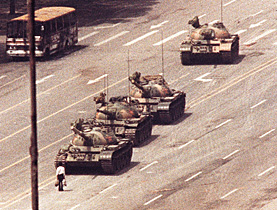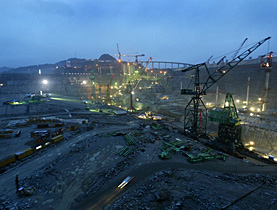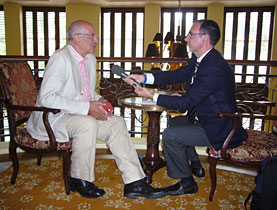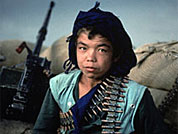Tiananmen memories spur desire for change

Twenty years after the Tiananmen Square massacre, protest leader Han Dongfang tells swissinfo.ch China is making positive changes but needs to address corruption.
The bloody crackdown on protestors on June 3 1989 led, officially, to 241 deaths and 7,000 injured. Several sources have put the actual death toll in the thousands, although it is unlikely that the true figure will ever be known.
The massacre is acknowledged all over the globe except in China, where censorship has completely obscured the events. Nevertheless Han, who now lives in Hong Kong, is optimistic that the tide has turned regarding Chinese human rights policy.
A former electrician on the Chinese railways, in 1989 he founded the first independent trade union in China. In the spring of that year workers and students became mobilised in Beijing and Han went on to become their leader.
After June 3, Han jumped on his motorbike intending to explore the country for a few years. But after just ten days, television and posters said there was a price on his head for involvement in revolutionary actions.
He handed himself into the police and landed in prison, where he languished for 22 months, enduring torture and contracting tuberculosis. His jailors eventually released him, for fear of being held accountable for his death.
Han managed to be treated in the United States, where he lost a lung but recovered his health.
“I promised my friends I would not let them down, so I went back to China via Hong Kong,” Han, now 46, told swissinfo.ch.
Challenge to power
But a visit to a conference in Switzerland presented the Chinese authorities with a chance to ensure he was barred further entry to the mainland – and has been ever since 1993.
“Shortly after returning to China, an officer told me I was not welcome, that I had violated the constitution. I answered that in that case, my rightful place was in a Chinese prison,” he said.
“It was then that they discovered a visa for Switzerland in my passport. I had attended a trade union conference in Geneva a few days earlier. I was issued with a multiple entry visa, even though I only wanted a single visa. At that point, it was easy [for the authorities] to deny me entry to China, as I could go elsewhere. I then moved to Hong Kong.”
Han has continued to campaign for workers’ rights in China ever since. He founded the China Labour Bulletin and hosts a show on Radio Free Asia. An optimist by nature, he believes China has changed.
“If lawyers and journalists are arrested for their ideas, it is because they dare to express them. They dare to defend forgotten causes, to challenge the powers that be,” he said.
“That was not the case just ten years ago. Many changes are going in the right direction, thanks to brave people, but also thanks to the Communist Party.”
Pragmatic approach
He explains that in Chinese history revolutionary action was always directed towards the reigning emperor, with a view to replacing him.
“The result is that for 2,000 years we have sacrificed hundreds of millions of lives for nothing. It is time to break this circle and focus on people’s lives. I do not care if the Communist Party remains in power for 20 years, 50 years or even a century if it changes its way of leading the country.”
This pragmatic approach is also advocated by Switzerland, through its dialogue with China on human rights.
Blaise Godet, the Swiss ambassador to Beijing, says “there is a greater propensity in the Chinese to address all these [human rights] issues than was the case some years ago”.
“The subject is no longer taboo, and anyway, we have no other choice than to continue this dialogue – before, during and after Tiananmen,” he told swissinfo.ch.
Does this mean China is slowly coming around to the democratic model?
“We are conducting a dialogue on human rights, not on democracy,” notes Godet. “The Chinese, for the moment, hold onto the primacy of the Communist Party. So to say that democracy is making progress … I would say that human rights are in particular, and this bodes well.”
Laying foundations
Democracy is a word that Han has stopped using in his speeches. He speaks simply about trying to improve people’s lives in terms of working hours, wages or social security.
“It will take time. Decades. I am laying the foundations for future generations,” he said.
But in the immediate future the apparent stability of China can be misleading, he warns. There are many pitfalls that could cause the system to wobble, starting with corruption.
“Political power is corrupt at every angle, to an extent previously unseen,” he said.
“But I do not believe that the decline of the Communist Party of China would lead to the end of corruption. So if the party really wants to fight against this scourge, I will happily be the first to work with them.”
Alain Arnaud in Beijing, swissinfo.ch (translated from French by Jessica Dacey)
The Tiananmen Square protests of 1989 were a series of demonstrations around Tiananmen Square in Beijing that began on April 14 and ended with a military crackdown on June 4.
The protests were led mainly by students and intellectuals and were sparked by the death of pro-democracy official Hu Yaobang. An estimated 100,000 people gathered in the square on the eve of his funeral, calling for economic change and democratic reform.
The military attempted to clear the square on June 4. The number of deaths is not known, but the Chinese government put the figure at 241 dead, including soldiers, and 7,000 wounded.
Government officials in the past have countered questions about Tiananmen by stating China has developed and prospered in the years since.
Chinese security forces were in place around Tiananmen Square on Wednesday ahead of the 20th anniversary, and the authorities shut down blogs, internet forums and social media sites such as Twitter.
According to Associated Press, dissidents have been shipped out of Beijing and most foreign media reports on the protests and calls for an independent investigation into the events of 3 June 1989 have been blocked.
But the anniversary will be openly commemorated in Hong Kong, the Chinese-ruled former British colony that enjoys freedom of speech.
Commemorations are also expected to be held around the world. Human rights organisations have called for demonstrations to be held outside Chinese embassies to increase pressure for calls for an independent investigation into the 1989 events.
In 1991 Switzerland became the first western country to initiate dialogue with China on human rights.
The talks, which are regular and are held in China and in Switzerland, centre on: criminal law and penal reform (including torture, administrative detention, the death penalty); freedom of religion, rights of minorities; social and economic rights; international mechanisms tied to human rights.

In compliance with the JTI standards
More: SWI swissinfo.ch certified by the Journalism Trust Initiative





You can find an overview of ongoing debates with our journalists here. Please join us!
If you want to start a conversation about a topic raised in this article or want to report factual errors, email us at english@swissinfo.ch.